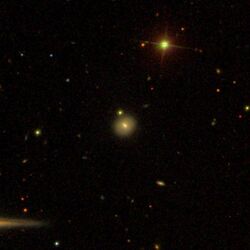Astronomy:NGC 321
From HandWiki
Short description: Elliptical galaxy in the Cetus constellation
| NGC 321 | |
|---|---|
 SDSS image of NGC 321 | |
| Observation data (J2000 epoch) | |
| Constellation | Cetus |
| Right ascension | 00h 57m 39.23461s[1] |
| Declination | −05° 05′ 10.1616″[1] |
| Redshift | 0.01616[2] |
| Helio radial velocity | 4806 km/s[2] |
| Apparent magnitude (B) | 16[2] |
| Characteristics | |
| Type | E[3] |
| Other designations | |
| MCG-01-03-043, PGC 3443[2] | |
NGC 321 is an elliptical galaxy[3] located in the constellation Cetus. It was discovered on September 27, 1864, by the astronomer Albert Marth.[4] Measurements of its redshift put it at a distance of about 217.4 ± 15.4 megalight-years (66.67 ± 4.73 Mpc), assuming a Hubble constant of H0 = 67.8 km/sec/Mpc.[5]
It was the location of the planet Eminiar VII in the original series Star Trek episode "A Taste of Armageddon" (where it was incorrectly identified as a star cluster).[citation needed]
References
- ↑ 1.0 1.1 Brown, A. G. A. (August 2018). "Gaia Data Release 2: Summary of the contents and survey properties". Astronomy & Astrophysics 616: A1. doi:10.1051/0004-6361/201833051. Bibcode: 2018A&A...616A...1G.
- ↑ 2.0 2.1 2.2 2.3 "NGC 321". SIMBAD. Centre de données astronomiques de Strasbourg. http://simbad.u-strasbg.fr/simbad/sim-basic?Ident=NGC+321.
- ↑ 3.0 3.1 "Search specification: NGC 321". HyperLeda. Université Claude Bernard Lyon 1. http://leda.univ-lyon1.fr/ledacat.cgi?o=NGC%20321. Retrieved 2021-02-02.
- ↑ Seligman, Courtney. "New General Catalogue objects: NGC 300 - 349". http://cseligman.com/text/atlas/ngc3.htm#321. Retrieved 2021-02-02.
- ↑ "Results for object NGC 0321 (NGC 321)". NASA/IPAC Extragalactic Database. California Institute of Technology. https://ned.ipac.caltech.edu/byname?objname=NGC%20321&hconst=67.8&omegam=0.308&omegav=0.692&wmap=4&corr_z=1. Retrieved 2021-02-02.
External links
 |

